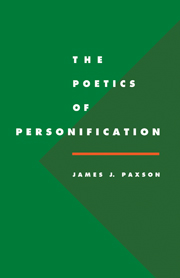Book contents
- Frontmatter
- Contents
- Preface
- Introduction
- 1 A history of personification theory
- 2 Towards a taxonomy of tropes
- 3 Narrative level, personification, and character ontology in Prudentius' Psychomachia
- 4 A phenomenology of personification
- 5 Personification, dreams, and narrative structures in Piers Plowman B
- 6 Narrating the personification of personification in The Faerie Queene
- Conclusion: Taxonomy II and future directions in personification theory
- Notes
- Works cited
- Index
4 - A phenomenology of personification
Published online by Cambridge University Press: 15 January 2010
- Frontmatter
- Contents
- Preface
- Introduction
- 1 A history of personification theory
- 2 Towards a taxonomy of tropes
- 3 Narrative level, personification, and character ontology in Prudentius' Psychomachia
- 4 A phenomenology of personification
- 5 Personification, dreams, and narrative structures in Piers Plowman B
- 6 Narrating the personification of personification in The Faerie Queene
- Conclusion: Taxonomy II and future directions in personification theory
- Notes
- Works cited
- Index
Summary
Job's silence in Prudentius' Psychomachia functions as an index of the text's self-conscious ontological relationship between fictional but “historical” human characters and purely figural ones. As we saw in chapters 2 and 3, speech and voice exist as reflexive constants in personification tabulation. Anthropomorphized abstractions who enjoy the power of human speech entail the formal engagement of prosopopeia. A silent or aphasic human figure, spatially and temporally proximate to prosopopoetic figures in a single and closed narrative domain, signals the text's adoption of its own characterological critique. Job's role and function in the Psychomachia is strange and novel; but he is still a narratologically “peripheral” character, appearing only in a single, delimited, local site. Far stranger would be a similar treatment of the narrator of the Psychomachia. Prudentius' poem, however, has been placed by tradition squarely into the category of third-person, visionary doctrine-literature. In this kind of literature, the narrator-commentator spins a fabular core that serves to convey directly his doctrinal messages. Naturally, the narrator must adopt a detached third-person stance. This seems to be the case regarding the Psychomachia. Or is it?
Near the conclusion of the poem and after the ending of the war proper, the narrator of the Psychomachia tells of the “assault” made by one last enemy intruder:
nam pulsa Culparum acie Discordia nostros intrarat cuneos sociam mentita figuram.
(For, when the Vices' army was driven off, Discord had entered our ranks wearing the counterfeit shape of a friend)
(683–84)- Type
- Chapter
- Information
- The Poetics of Personification , pp. 82 - 113Publisher: Cambridge University PressPrint publication year: 1994

